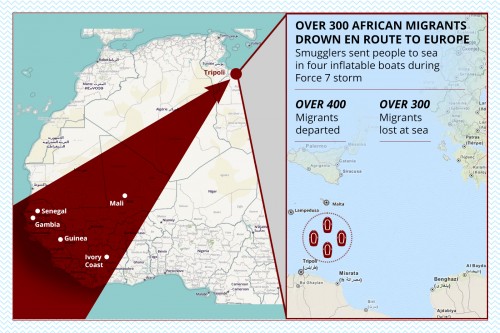Latest tragedies in the Mediterranean Sea require renewed attention
Migration 23 February 2015When Italy decided to launch the Operation Mare Nostrum at the end of 2013, the aim was to provide a constant patrolling of the Central Mediterranean sea, to avoid the repetition of tragedies by providing immediate support to boats in distress. Frontex Joint Operations were already active in the Central Mediterranean, but with a limited amount of means and with the objective to support border control. In compliance with the scope of the Agency, and not to provide wide search and rescue operations.
As a matter of fact, the constant presence of Mare Nostrum vessels in the Mediterranean did not reduce the number of deaths and arrivals through the Central Mediterranean route. On the contrary, the situation worsened. According to Frontex, 278.000 migrants arrived in the European Union in 2014, 2.5 times than in 2013. Of those, 170.757 arrived in Italy, which became the preferred country of arrival for boats coming from the central and eastern Mediterranean. As we explained in a previous issue of NEU, IOM reported that in 2014 more than 3000 people died in the Mediterranean Sea, four times more than in 2013. More accidents happened not only because of the increase of people willing to cross the Mediterranean, but also because stronger and better organized smuggling networks understood that they could count on the constant presence of Mare Nostrum vessels near African coasts. Smugglers started to use poorer means of transportation and less fuel. While in 2013 a steel boat used to carry 70 people, the same boat (they are often reused) is carrying today around 400 people. It similarly happened with rubber and wooden boats.
It is undeniable that the increase of death in the Mediterranean sea is due not only to the raise of the total number of people fleeing from their countries (especially Syria, Iraq and Eritrea) and the new smuggling practices, but also to the pull factor resulted by the Mare Nostrum presence.
What is the situation today?
The Mare Nostrum operation became unsustainable for Italy. The Italian Ministry of Internal Affairs calculated that in one year the operation cost more than €100m. EU contributed to Mare Nostrum with €1.8m through the External Borders Fund and continued the Joint Operation Hermes, with a yearly budget of €5m.
Italy called many times for a joint commitment of all Member States and Frontex to substitute this operation. Eventually, an agreement was found to launch on the 1st November 2014 a new Frontex joint operation called “Triton”, with a monthly budget estimated around €2.9m.
Notwithstanding the reduced presence in the Mediterranean, during January 2015 3.518 migrants have landed in Italy, 1.400 people more than those who arrived in the same period last year.
Moreover, after 3 months from its establishment, new accidents happened in the Mediterranean. 100 people were saved on Monday 9th February, Survivors said that four inflatable boats left from a beach near Tripoli on Saturday. Twenty-nine migrants died, most of them of hypothermia, on board of a Triton vessel, after they were rescued. Only two people were recovered from another boat which, according to survivors, had departed with 107 passengers and only seven people survived on another which had carried 109 people. A fourth boat is missing and, in total, the death of 300 men is suspected.
UNHCR and NGOs have repeatedly called on the creation of a well-resourced European search and rescue initiative to avoid deaths at sea.
After last week events, UN High Commissioner for Refugees António Guterres said that “There can be no doubt left (…) that Europe’s Operation Triton is a woefully inadequate replacement for Italy’s Mare Nostrum” ,“The focus has to be about saving lives. We need a robust search and rescue operation in the Central Mediterranean, not only a border patrol”. For the same reason, the Italian Council for Refugees (CIR) has urged the EU to modify the regulation of the EU Border Agency Frontex to include search and rescue at sea in its mandate or to establish a Search and Rescue Agency.
What now?
This is a question with no easy answer, and we can’t do anything else but leave it open. On one side, 2014 proved that reinforced search and rescue operation do not reduce the number of deaths in the Mediterranean, but increase it dramatically. On the other side, the sudden reduction of vessels did not lead to a decreased effect of the aforementioned pull factor, and immediately lead to a great tragedy.
It is evident that smugglers are blackmailing the European Union and they will not give up on any possible sources of profit made on the desperation of other human beings, who do not have anything to lose by trying to reach the European Union. In addition to this difficult situation, troops of the Islamic State are threatening Libya, Syria and other countries, causing hundreds of people fleeing to save their lives.
“However, we believe, that rescue at sea, even if necessary, cannot be the only answer. Measures that provide protected entry to refugees must be put in place as an alternative to their current option, to put their lives in the hands of traffickers”, said Christopher Hein, from the Italian Council for Refugees (CIR), “we are talking about very specific measures that could be brought about by making some changes at a national and at an EU level: from the release of humanitarian visas, to the opening of resettlement programs and humanitarian channels, to the possibility of sponsorships until the option of requesting asylum from third world countries is implemented. These are essential steps that need to be taken to save thousands of lives, otherwise the only thing we have left to do is wait for the next announced tragedy of the Mediterranean”.



